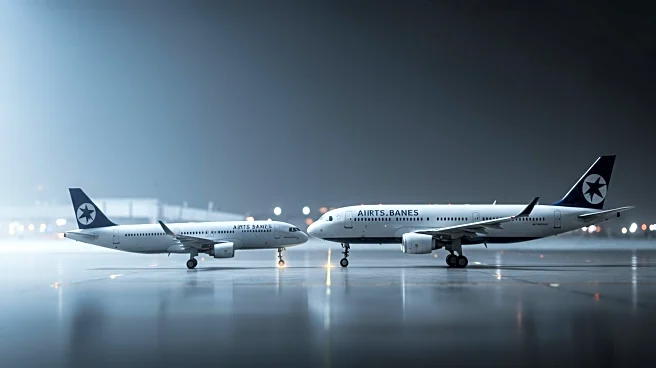What is the story about?
What's Happening?
Korean Air has received regulatory approval to merge with Asiana Airlines, a plan initially announced in November 2020. The merger aims to stabilize South Korea's aviation sector and enhance global competitiveness. The U.S. Department of Justice granted final approval in December 2024, allowing the two airlines to operate as a single commercial entity under separate Air Operator Certificates (AOCs) for two years before fully merging operations. Subsidiaries Jin Air, Air Seoul, and Air Incheon will consolidate under the Jin Air brand. Korean Air plans to increase its international passenger share and expand foreign cabin crew hiring, alongside a major cabin retrofit program on Boeing 777-300ERs to introduce premium economy seating.
Why It's Important?
The merger between Korean Air and Asiana Airlines is set to reshape the competitive landscape in Northeast Asia, potentially elevating Korean Air into the top 10 airline groups globally by size. This consolidation is expected to enhance operational efficiency and service standards, benefiting passengers through improved offerings. The integration could also lead to increased employment opportunities, particularly in international cabin crew roles. The merger's success may serve as a model for other airlines seeking stability and growth in a post-pandemic environment, influencing global aviation strategies.
What's Next?
Korean Air and Asiana Airlines will continue discussions to harmonize operations, focusing on service standard alignment. The integration process will likely favor Korean Air's established practices, though Asiana's strengths may be adopted. The airlines aim to boost international passenger numbers and expand cabin crew hiring. Korean Air is addressing fleet challenges, including repainting older aircraft to meet capacity demands. The merger's progress will be closely monitored by industry stakeholders, with potential adjustments in fleet management and service offerings.
Beyond the Headlines
The merger highlights the strategic importance of regulatory approvals in international business operations, particularly in the aviation sector. It underscores the need for airlines to adapt to changing market conditions and consumer preferences, such as the demand for premium economy seating. The integration process may reveal insights into effective cross-cultural management and service standardization, offering lessons for other industries facing similar challenges.

















